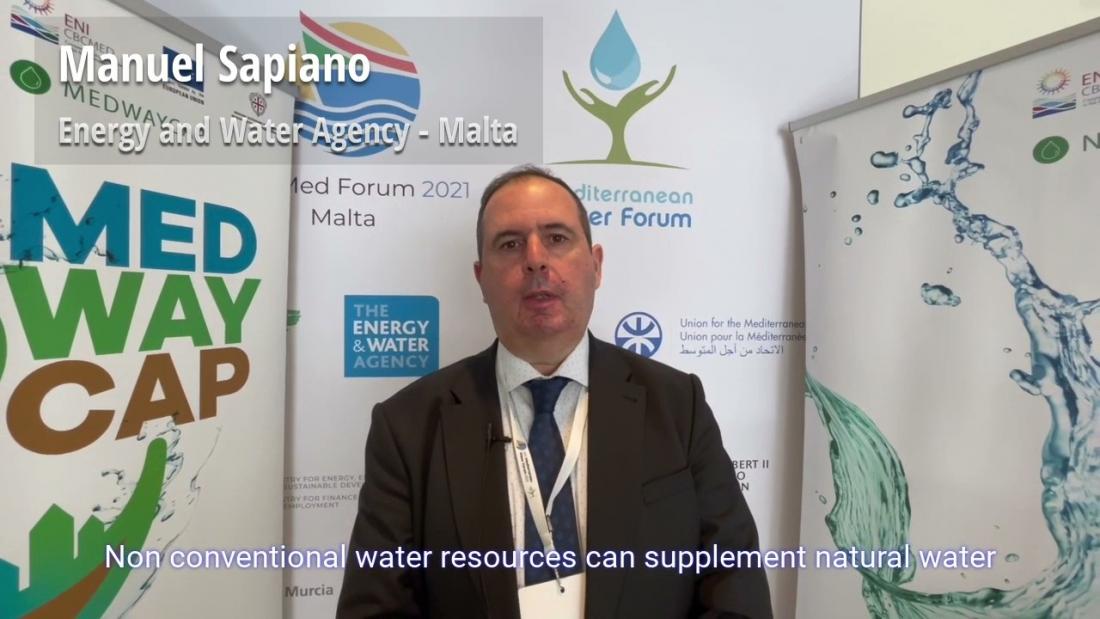NAWAMED: “We need a regulatory process which will enable water managers to get the confidence of consumers”, interview to Energy Water Agency of Malta, Chief Executive Officer, Mr. Manuel Sapiano

The Euro-Mediterranean Centre for sustainable development– SVI.MED, partner in NAWAMED and MEDWAYCAP projects, attended the 4th Mediterranean Water Forum (MWF) in Malta last December to share its knowledge and establish new connections with potential international partners. A set of interviews with a number of speakers were conducted during the event to identify ways to promote innovative solutions and technologies that can improve water efficiency, starting with the reuse of treated wastewater.
The MWF has been organized by the Water&Energy Agency - EWA of Malta, partners with SVI.MED in both projects, the Institut Méditerranéen de l’Eau - IME and the Union for the Mediterranean - UfM.
The Energy & Water Agency is an organization of the Government of Malta. Since starting in 2014 their mission has been “to ensure the security, sustainability and affordability of energy and water in Malta”.
As a governmental agency, EWA formulates and coordinates the implementation of the Government’s national policies for energy and water, as well as EU legislation for energy and water sustainability. EWA also acts on laws and set in motion policies related to renewable energy, energy efficiency, water demand management, and the security of Malta’s electricity, gas and water supply.
Through extensive modelling and research, EWA forecasts Malta’s energy and water demands and work to ensure energy and water are delivered across the country in an environmentally stable way.
Manuel Sapiano is EWA’s CEO: we asked him about the importance of non-conventional water resources.
Non-conventional water resources can supplement natural water resources which in the Mediterranean are scarce. Therefore, we know that we do not have sufficient natural water resources for sustaining the demand of the population. So, what can we do? One possible solution is augmenting these resources whilst also giving due consideration to efficiency and demand management - how to use water effectively
But still if we are efficient, we don't have enough natural water resources, so therefore we need alternative water resources, which can help us use whatever we have, whatever nature gives us in sustainable way, to ensure that natural water resources can survive and keep providing their essential value in the future.
But let me say that there are too many weaknesses. First of all, when you are producing water you need energy, and energy has its own footprint. Today most of Mediterranean countries are based on conventional energy and that has emissions.
Let’s look forward up to 2050 where we're moving on the de-carbonization trend in the energy side. Can we look at non-conventional water resources being developed and using renewable energy?
That would eliminate one of the big concerns raised on non-conventional water resources.
The other one relates to consumer confidence. We need a regulatory process which will enable water managers to get the confidence of consumers, so that this important resource is not wasted. And promote the paradigm of waste water being a waste into waste water being a resource, which can be used for sustainability.
The MWF enabled both NAWAMED and MEDWAYCAP projects to gain a better understanding of the pathway to strengthen the value and impact of innovative integrated Non-Conventional Water Resources management solutions through a Mediterranean Alliance for a collective learning towards effective policies and innovation processes.
Watch a clip of the video interview here.
After 10 months, a new important occasion to debate all these issues: SVI.MED. and EWA are in fact, organizing, in the context of NAWAMED project, an international event in Syracuse (Sicily), from the 3rd to the 5th of October, involving the main actors at Mediterranean level to compare opinions about “Mediterranean green transition toward climate change adaptation and circular water management”.
Stay tuned!









